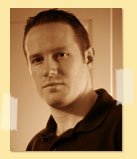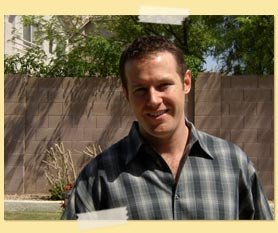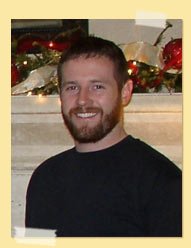Survivor Narrative
Brock
“What a pathetic mess,” I thought as I listened to him cry and boast about another one of his secret sexual encounters behind stall doors, public parks, health clubs, chat rooms, and bath houses. Here I was again at another Dallas ex-gay meeting, with a bunch of weenies in the back of the Church of Christ. The 20-something members of my group sat in a circle around a chair-less, pale-yellow room giving accounts of our madness. 
I look back now and my heart breaks for these men, confused and tormented by their natural need. But the thousands of men and women in these groups aren’t weenies at all. By one means or another they have taken the first step in coming out of denial about their orientation, usually at the risk of losing many people they thought were friends.
I was trying to find myself, and my story wasn’t much different. I was reared in a grade-A, conservative, Christian household, home schooled through elementary, excelled through high school and college, an athlete, a musician, a worship leader in my youth groups, and a proficient Bible boy who could spit verses at the devil. I had an abundance of friends, a family that loved me, all the opportunities of an all American red-haired kid, and the pride of a Bible-beating, full blooded Texan. Yet a part of me had been dying inside since puberty. I wanted to be loved and touched by a man instead of a woman.
Because of my conservative background, I resisted giving into any kind of sexual temptation all the way up into college. I finally spoke to someone I trusted, the pastor of a small church I was going to. My hands shook and my voice quaked as I revealed in privacy the decay of my mind, the struggle of my soul, the “thorn of my flesh.” Through prayerful discussions my heart began to change. For the first time in my life I felt affirmed by the powerful love of God. I quickly got involved in worship ministry with several college ministries and churches in town, hoping that my thoughts and desire would lessen.
But my desires became stronger, and before long I got into an extremely unhealthy relationship with a man who was married, father of several kids, and a conservative member in the community. My pain only deepened, because I was filled with shame and guilt for what I was doing. We both justified our actions, and were completely convinced that to be gay openly was wrong, but to be sexual with each other in secret was okay. (I’m still not sure how we exactly justified this, but it took some creativity.)
Through a series of painful events I got out of that relationship. But I soon discovered the desolate underground promiscuous subculture of lost, closeted men. I couldn’t believe the staggering amount of married men entrapped by their homosexual desire. The temptations were everywhere. The accessibility for sex, combined with the shame I felt from my desire to be with another man, and compounded by the lack of outlet to express my feelings or thoughts could easily spiral me out of control, seeking another rendezvous to ease the pain.
After college I decided to move back to Dallas and go about changing my sexuality.
My search led me to a small group in Dallas. We used methods of non-sexual holding and cuddling, smacking a rubber band against our wrists or cracking ammonia pills to inhale every time we had a homosexual thought. We were encouraged to begin masturbating at home using thoughts of women. From the time I started going there I knew there was something wrong with the foundation of this group’s teaching. I never once was introduced to a man who had been cured of his attraction. I never saw any progress in any of the men there with their struggle. A large number of the men were pastors, deacons, university officials, politicians, worship leaders, etc. Sadly, many had been there for 5+ years, paying thousands of dollars for the hope of a change.
After about 6 months of therapy I left the ex-gay group in 2001, began a quest to understand if there really was legitimate reasoning for God to ask any of his creation with a homosexual desire to abstain for the remainder of their life. My search led me through dozens of books written on the subject from both sides of the issue. I found a hetero, retired, Lutheran pastor in Arizona that began showing me the truth behind what the Bible truly says for gays and lesbians. My prayer and questions have not been unanswered, and to this day God is leading me to many other men and women who affirm me for who I am, and the way God made me to be.
Although my ex-gay stint isn’t a story of years and years of group therapy, my battle with my sexuality has been excruciatingly difficult. For me, moving beyond ex-gay had a lot to do with my own personal research, digging for truth, reading, talking with elders, creating lists of the evidence on both sides of the issue for why I need changing, listening to sermons, debating, etc. I credit most of my discoveries to basic logic that I’m convinced God wants us to use. And I’d like to finish by listing five major things I’ve learned along my journey.
I am not a mistake. I know now I am wonderfully made by a loving God, special in my design. No one will ever take that from me again.
I am convinced that I cannot change my sexuality. I’ve seen no evidence to lead me to think otherwise. I can no more change what gender I would prefer to be with than the color of my eyes. I’ve grown accustomed with this life of mine, and I’m happy now in the way I was made.
Deception rots the soul. It’s no accident I have been brought in contact with so many gay men who have chosen to get married as an act of integrity and self-sacrifice to their orientation. Most of them are good men convinced that they are doing the world a service by denying their sexual leaning. Ironically, the exact opposite comes to fruition because of the deception they introduce into their homes, churches, businesses, and relationships.
I believe our society desperately needs the church to be an example of love and grace for the gay and lesbian community. We need the body of Christ to give council to the weak, reach out to the lost, and teach true direction that leads to life and not exclusion. The church has erred on many issues in the past. My hope is that by reflecting on those mistakes the church can come into a place of helping the gay community.
Lastly, I have a responsibility to share the freedom and truth I’ve found with others. And I guess I’ve just begun.
